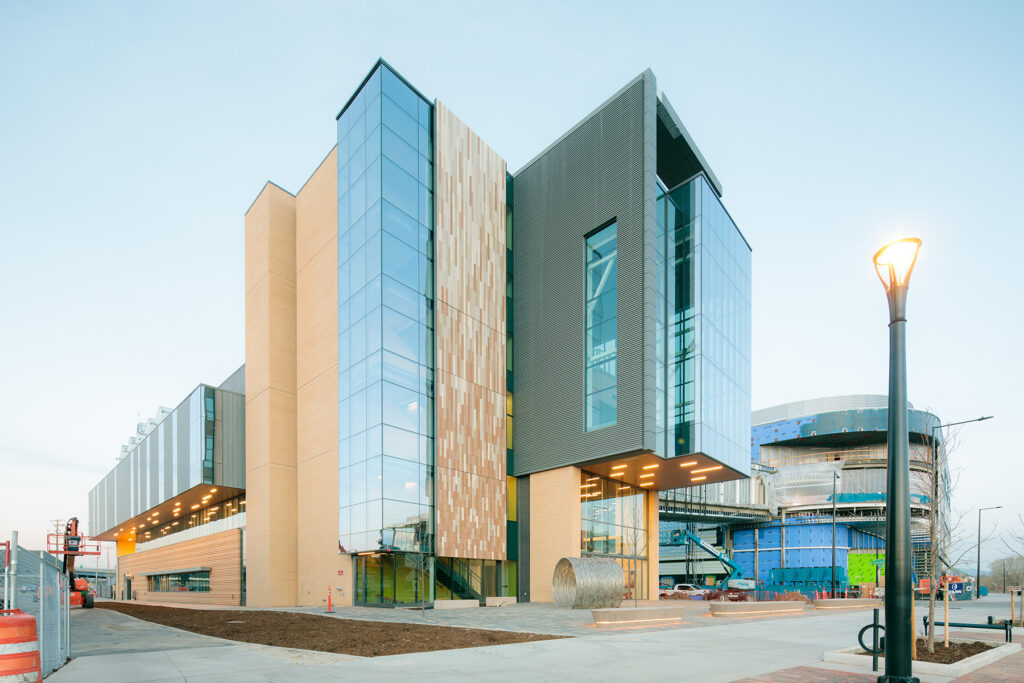
SEE, DO, LEARN
Here’s what you can experience at CSU Spur in Denver.
July 1, 2022
THE NEW CSU SPUR CAMPUS IS THE EDUCATIONAL ANCHOR at the National Western Center in north Denver. But visit, and you’ll see this is no typical campus.
Spur is focused on public education, research, community outreach, and collaboration with business and industry. And its programs center on food, water, and animal and human health. These are topics the CSU System and its campuses excel at studying and teaching – and they’re matters central to the globe’s most urgent challenges.
Spur’s programs probe connections among these subjects, while also connecting rural and urban communities that define Colorado. Spur holds a prominent place on the historic grounds of the National Western Stock Show; yet, it seeks to shape the future by exciting kids about careers in science, technology, engineering, and math – the STEM fields that drive innovation. For this reason, science is on full display at Spur; in many cases, visitors are invited to participate.
Visit, and you’ll experience all there is to see, do, and learn at a campus designed for everyone.
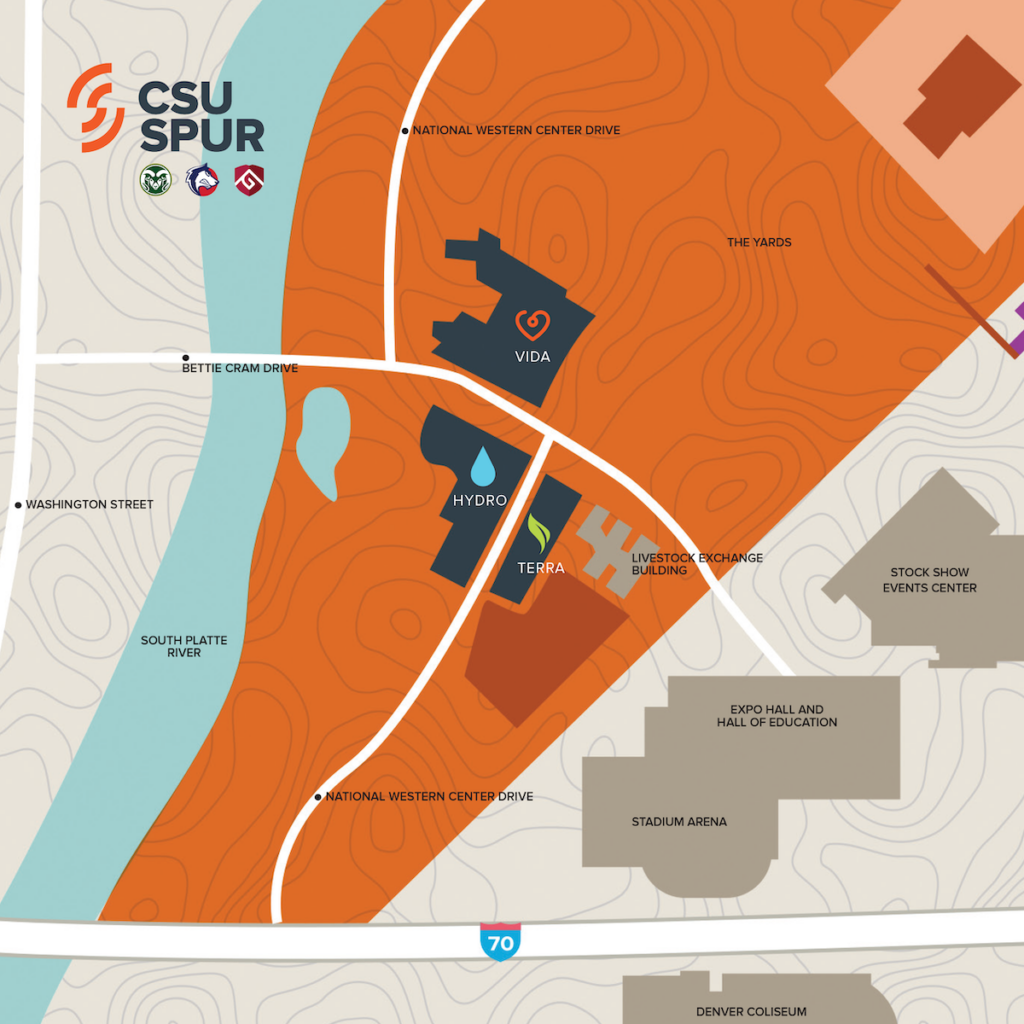
Spur is free and open to the public.
- CSU Spur comprises three buildings: Vida, for animal and human health; Terra, for food and agriculture; and Hydro, for water.
- Vida and Terra are open to the public Monday through Saturday, from 9 a.m. to 5 p.m.
- Hydro will open on Jan. 6, 2023.
- Address: 4817 National Western Drive, Denver, CO, 80216
- For directions and more information,
visit csuspur.org. - Questions? Email csusystemspur@colostate.edu.
VIDA: ANIMAL AND HUMAN HEALTH
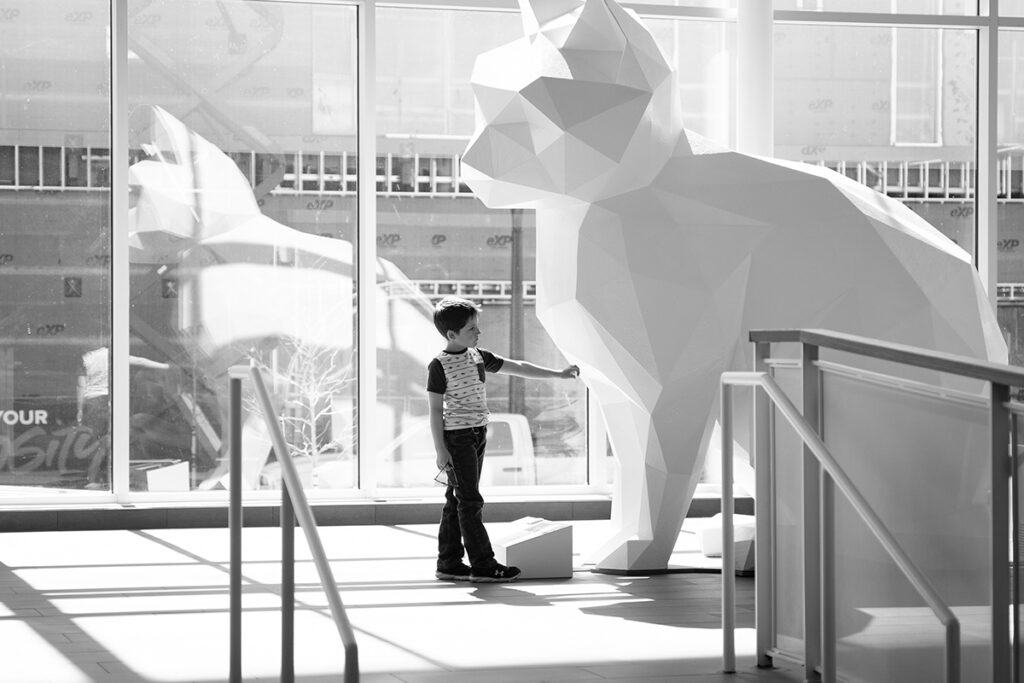
- BUSY BODY: Grab your headset! Bodily structures come into focus during immersive, 3D experiences that use virtual reality to teach visitors about animal and human anatomy.
- WATER WORKS: The Denver Water education team leads hands-on experiements during Water Wednesdays at CSU Spur. Kids can learn about watersheds and engage in activities like a water delivery challenge and testing pH to understand acidity.
- SLEEP IN: Lodging is available on site for students and guests who are learning and working at CSU Spur.
- LET’S PRETEND: After observing veterinary care in action, walk through a replica vet clinic. Review radiographs, consider patient histories, and decide how you’d treat dogs, cats, and horses with health problems. Kids love this mock clinic.
- COOL CAT: This 9-foot kitten meows when approached from the front and hisses when approached from behind. It’s the purr-fect way to teach visitors about animal behavior.
- ON DISPLAY: Exhibits and interactive digital displays enhance learning at CSU Spur. One such display features animated dog, cat, and horse characters that offer fun facts and describe life on a farm.
- THERAPEUTIC VALUE: Children and adults with health challenges benefit from equine-assisted therapy at the CSU Temple Grandin Equine Center. It’s named for Professor Grandin, a world-famous animal scientist and advocate for people with autism.
- SPORT HORSE: Human athletes see specialists to prevent and rehabilitate from injuries. Same goes for horses. At the Equine Sports Medicine and Rehabilitation Clinic, hardworking horses make a splash in an underwater treadmill and receive other veterinary care for peak performance.
- PATIENTS ARE A VIRTUE: Watch as pets undergo health checks, dental procedures, and surgeries at the Dumb Friends League Veterinary Hospital at CSU Spur. The nonprofit provides donor-subsidized care for the pets of Denver families who otherwise could not afford it. CSU veterinary students are trained in the process. The hospital is unique in putting medical treatment for pets on full view for visitors.
TERRA: FOOD AND AGRICULTURE
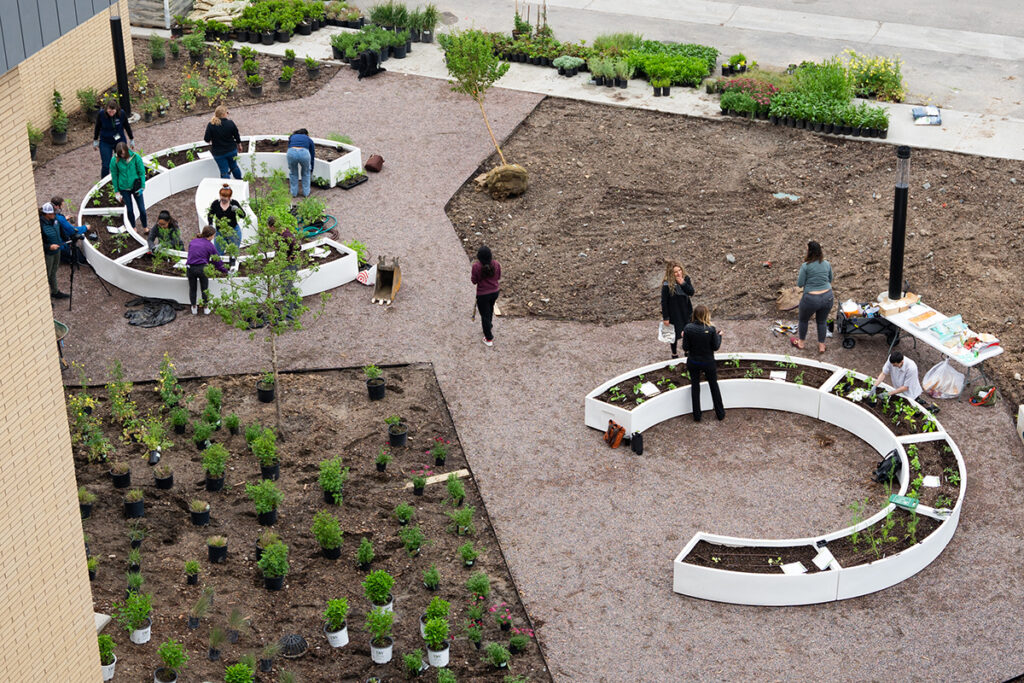
- DISCOVERY ZONE: A series of agricultural discovery exhibits spans multiple floors in Terra, teaching visitors about food systems from farm to plate. Visitors explore where food comes from and their role in keeping systems sustainable.
- GREEN UP: Atop Terra, green roof systems and an expansive greenhouse show how urban spaces may be used for plant and food production.
- WHAT’S COOKING: A teaching and culinary kitchen offers space for community cooking classes and for preparing and perfecting new products developed in nearby food labs.
- RESEARCH HUB: The Metropolitan Agricultural Research Center collaborates with outside partners to study urban farming, community food systems, and innovative farming technologies. It’s the newest branch of the Colorado Agricultural Experiment Station and is unique in researching both urban and rural concerns.
- FOOD SCIENCE: In state-of-the-art food labs, outside companies and entrepreneurs develop value-added meat, dairy, and fruit and vegetable products. Think sausage, yogurt, salsa, and many other items that involve new ways of safely processing and packaging raw ingredients.
- TESTING, TESTING: Terra offers a one-stop shop for soil, water, and plant analysis. Homeowners, farmers, and researchers may drop off or mail in samples to the Agricultural Diagnostic and Analytical Services labs. The labs diagnose plant disease, identify pathogens and pests, and evaluate issues such as soil fertility, water quality, and plant nutrient levels.
- INDOOR FARMING: A demonstration lab grows leafy greens, showing how light technology may be used for large-scale crop production indoors. Researchers also test temperature, humidity, and carbon dioxide variables to maximize crop yields inside vertical growth chambers. The systems are known as controlled-environment horticulture.
- GLOBAL IMPACT: Where in the world are students, faculty, and alumni? An interactive digital map shows the CSU System’s global reach, highlighting teaching, research, and service at scores of sites worldwide. The exhibit is called CSU Impact and is part of a broader effort to promote international agriculture.
- TASTE TEST: A sensory lab invites visitors to sample food products to assess flavor, texture, aroma, and other attributes.
- LEARNING LAB: CAM’s Ag Academy, in the Morgridge Learning Lab, immerses middle school and high school students in complex problems and potential solutions in food and agriculture. Working in small teams, students explore topics such as hunger and food access, then describe how they’d tackle the issues.
- IN FOCUS: Successful product launch often relies on market research. Here, rooms are available for focus groups that provide input about new food products – and whether they appeal to the tastes, health interests, and busy lifestyles of consumers.
- GARDEN PARTY: A Community Food Justice Garden is sprouting in raised beds outside Terra. The garden provides fresh produce for neighborhood residents and is a collaboration involving CSU Extension, GrowHaus, and Denver Urban Gardens.
HYDRO: WATER
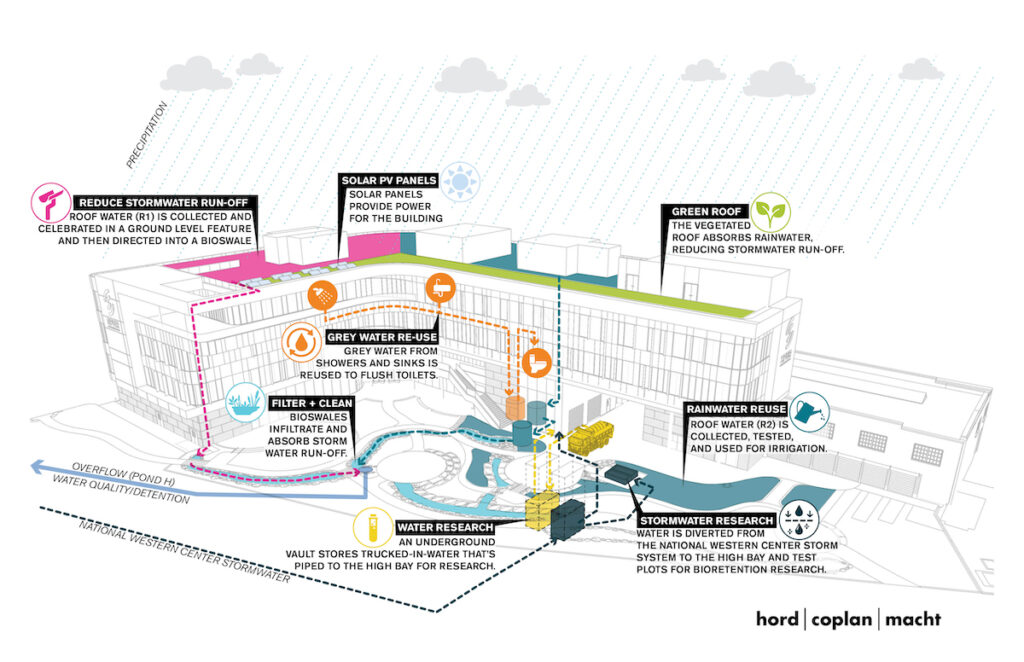
- CLEAN AND DIRTY: Researchers with CSU’s One Water Solutions Institute will test new technologies for the treatment and use of water from multiple sources. That includes wastewater, stormwater, and roof runoff. They’re working with the principle that all water is valuable when treated properly, matched to an appropriate use, and managed in one integrated system.
- ON THE ROOFTOP: You’ve got your green roofs. You’ve got your rooftop solar panels. Now, put them together for a crop production system called “rooftop agrivoltaics,” a fresh take on growing produce in urban settings – while also producing renewable energy. Also atop Hydro, researchers will study stormwater management with green roofs.
- WATER QUALITY: Denver Water – Colorado’s oldest and largest water utility – is opening a new water quality lab in the Hydro building. It will have capacity to conduct more than 200,000 tests each year to help ensure high-quality water for some 1.5 million people in Metro Denver.
- THINK AGAIN: Hydro will host three think tanks that examine policies and practices related to agriculture and the environment. They are: the CSU Salazar Center for North American Conservation, the North American Agricultural Advisory Network, and Together We Grow.
- RIVER RESTORATION: The South Platte River runs along the western edge of CSU Spur, providing a backdrop for the Hydro building – and a focus for its water-related programs. The river is undergoing major cleanup and restoration, led by the city and county of Denver and its partners. The project will transform the riverfront into a main attraction at Spur and the entire National Western Center.
- HEADWATERS: Did you know Colorado is a “headwaters state”? Snowmelt starting high in the mountains flows outward from the Continental Divide to supply water in Colorado and many other states. Landscaping outside the Hydro building will help visitors learn about our four major watersheds – defined by the South Platte River, Arkansas River, Rio Grande, and Colorado River.
- ON STAGE: A flexible theater space will provide a site for performing arts, lectures, film showings, and other events. Seats 250.
- MEET AND GREET: Ample meeting space will be available for businesses and organizations looking for a convenient Denver location.
- EAT UP: Grab a bite at the Hydro café. The menu will feature produce grown on site.
- THE CREATIVE PROCESS: Watch artists at work in CSU Spur studios that look out on the South Platte River.
CAMPUS: BUILDINGS, GROUNDS, AND OUTREACH
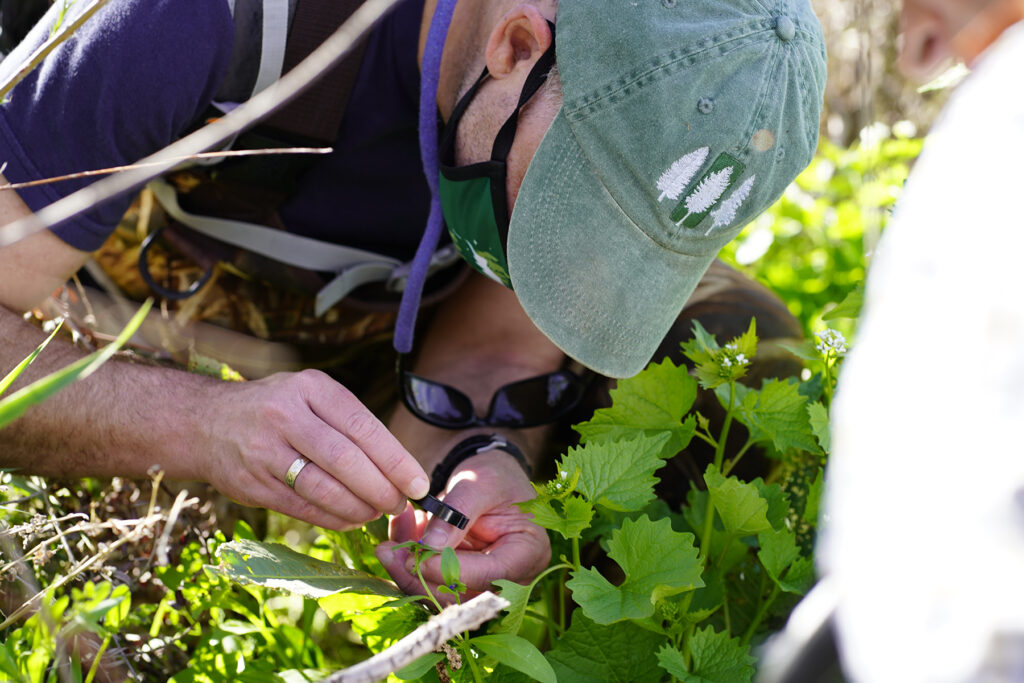
- SCIENCE IS BEAUTIFUL: CSU Spur features eight installations of public art, created by artists in Colorado and beyond. These pieces contemplate the essential roles of food, water, and health in our lives.
- STUDENT AID: Students from the 80216 ZIP code, which covers the Globeville and Elyria-Swansea neighborhoods near the National Western Center, are eligible for the newly established, $10,000 CSU Spur Scholarship. The need-based scholarship is for students admitted to CSU, CSU Global, or CSU Pueblo. The first recipients attended in 2021-2022.
- POWER OF PARTNERSHIP: The CSU System has partnered for several years with Bruce Randolph School, a Denver Public School with students in grades 6-12. Programs tied to CSU Spur, nearby, have encouraged students toward college and careers in food, water, and health.
- FAMILY THERAPY: The Family Resilience Center offers assessments, therapy services, and professional training to promote healing, growth, and strength in families whose members have experienced traumatic life events. It’s a program of the CSU Department of Human Development and Family Studies.
- BEE NICE: Gardens will be abuzz at CSU Spur: They’re designed to attract bees, butterflies, moths, and other pollinators.
- NEW DEGREE: Students seeking advanced learning in food innovation and entrepreneurship may enroll in a new CSU master’s degree program, which will hold classes in person at CSU Spur. The 18-month degree program is called Master of Agribusiness and Food Innovation Management. Classes start in August.
- FLORA & FAUNA: What kinds of plants and animals live in the South Platte River near the National Western Center? CSU scientists and collaborators are learning with a series of biological inventories called CSU Spur bioblitzes. The events have already tallied hundreds of plant, bird, and mammal species.
- HOT TAKE: Dirty water produces clean energy at the National Western Center. It’s thanks to an innovative system that captures thermal energy from Denver wastewater – issued by thousands of showers, tubs, dishwashers, and toilets – and then uses it to heat and cool buildings. It is the largest sewer-heat recovery system in North America and will fill 90% of heating and cooling needs in buildings at the center.
- ROAD SHOW: Campus programs hit the road with a mobile lab called Sci on the Fly. It’s a truck-and-trailer rig that delivers engaging STEM education to communities statewide, with help from computers and wireless Internet technology. Look for the mobile lab at county fairs and other community events. It’s run in partnership with CSU’s College of Veterinary Medicine and Biomedical Sciences.
- WATER FEATURE: The CSU Spur Water in the West Symposium is an annual event that focuses on one of the world’s most precious and increasingly scarce resources. Experts and stakeholders convene to identify challenges and solutions in the world of water. The next symposium is Nov. 2-3. For information, visit csuspur.org/witw.
Photo at top: Matthew Staver
SHARE
